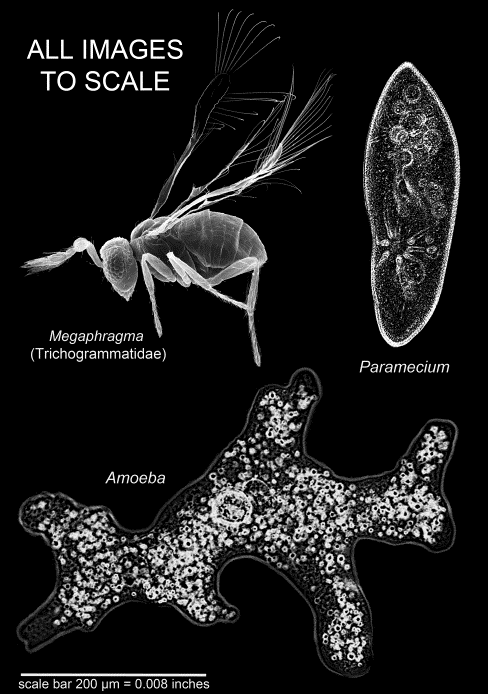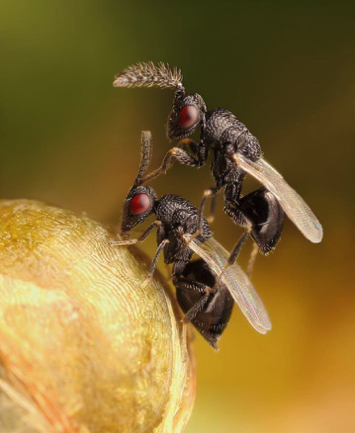About

Chalcidoidea
Chalcidoidea (jewel wasps) are among the most species rich, ecologically important, and biologically diverse groups of terrestrial organisms. Their diversity is staggering, with more than 500,000 species thought to exist. These minute wasps (mostly 1–2 mm in size) are numerically abundant and common in almost every habitat. The smallest of these wasps are smaller than a typical single-celled organism (much smaller than the dot at the end of this sentence), and yet the adults can fly, mate, locate their hosts, deposit their eggs, and as larvae, consume their insect hosts.
Parasitoid Wasps
Most chalcidoid wasps are parasitoids, which means that they feed on their insect hosts, and eventually kill them. A few groups have also evolved to attack plant hosts and some serve as pollinators. These wasp are *not harmful* to humans, but instead they are of great benefit by killing other insects.
Biological Control
Because they attack other insects, chalcidoid wasps are widely used in the natural control of major pests, with outcomes documented to result in decreases in pesticide, increases in yield, and in landmark cases direct savings of billions of dollars or permanent pest control.
What is included in these pages?
We have included a broad range of instructional materials that are helpful in 1) learning about these fascinating wasps, 2) providing instructional materials for teachers to use in the classroom including videos, class and field experiments, and craft suggestions, 3) providing materials that aid in a better understanding of the use of chalcidoid wasps in agricultural enviroments for use by Master Gardeners and Extension Researchers, and 4) provide an introduction to the diversity and natural history of these fascinating wasps. As well as learning about wasps, the modules are focused on developing an understanding of biodiversity and the potential to enhance biodiversity and natural control in urban areas.

External links
The use of external links does not equate to their endorsement.Citing
chalcid.org contributors. 2018- . Chalcids 101. http://outreach.chalcid.org.
Contributing
The code behind outreach.chalcid.org is available at https://github.com/chalcid/outreach.
You can help the project grow. Provide feedback using our issue tracker (you'll need a free Github user account):
- Feedback from teachers, outreach specialists
- Suggest an improvement or modification to and existing page
- Contribute a new taxon page
- Read more about contributing
Contributors
In addition to those who have made commits directly to this repository for this website, we are thankful for contributing from the following (alphabetical order):
- _Last name, first name. Institution_
Support
This material is based upon work supported by the National Science Foundation under Grants DEB-15-55053. Any opinions, findings and conclusions or recommendations expressed in this material are those of the author(s) and do not necessarily reflect the views of the National Science Foundation.